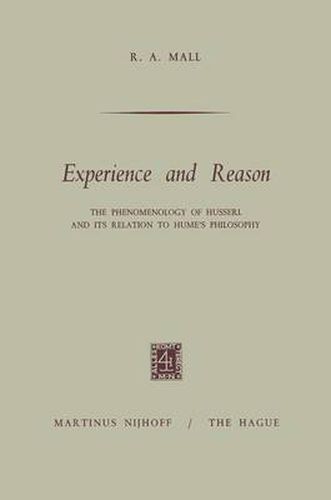Readings Newsletter
Become a Readings Member to make your shopping experience even easier.
Sign in or sign up for free!
You’re not far away from qualifying for FREE standard shipping within Australia
You’ve qualified for FREE standard shipping within Australia
The cart is loading…






This title is printed to order. This book may have been self-published. If so, we cannot guarantee the quality of the content. In the main most books will have gone through the editing process however some may not. We therefore suggest that you be aware of this before ordering this book. If in doubt check either the author or publisher’s details as we are unable to accept any returns unless they are faulty. Please contact us if you have any questions.
In this work the author has tried to present a brief exposition of the phenomenology of HusserI. In doing this, he had in mind a two-fold purpose. He wanted on the one hand to give a critical exposition, interpretation and appreciation of the most leading concepts of HusserI ian phenomenology. On the other hand, he tried to show that a true comprehensive understanding of HusserI’s phenomenology culminates in his teaching of experience and reason. It is the strong conviction of the author that the central-most teaching of HusserI’s phenomenology is the discovery of the noetic noematic correlativity. In the reduced realm of constituting intentionality, the distinction between reason and experience seems to vanish, and these two concepts become interchangeable terms. The present study suffers from one great limitation, and this must be made clear right here in order to avoid any misconception about the author’s intentions. The author has not discussed the other important theories of experience and reason. He has undertaken the humble task of giving an account of HusserI’s phenomenology of experience and reason. The bringing in of Hume serves, as would be clear in the course of the book, a two-fold purpose. It tries on the one hand to show the pro grammatic similarity between the philosophies of these two philoso phers. On the other hand, it implicitly maintains that the philosophical continuity from Hume to HusserI runs not so much via Kant, but rather via Meinong, Brentano, A venarius, James and so forth.
$9.00 standard shipping within Australia
FREE standard shipping within Australia for orders over $100.00
Express & International shipping calculated at checkout
This title is printed to order. This book may have been self-published. If so, we cannot guarantee the quality of the content. In the main most books will have gone through the editing process however some may not. We therefore suggest that you be aware of this before ordering this book. If in doubt check either the author or publisher’s details as we are unable to accept any returns unless they are faulty. Please contact us if you have any questions.
In this work the author has tried to present a brief exposition of the phenomenology of HusserI. In doing this, he had in mind a two-fold purpose. He wanted on the one hand to give a critical exposition, interpretation and appreciation of the most leading concepts of HusserI ian phenomenology. On the other hand, he tried to show that a true comprehensive understanding of HusserI’s phenomenology culminates in his teaching of experience and reason. It is the strong conviction of the author that the central-most teaching of HusserI’s phenomenology is the discovery of the noetic noematic correlativity. In the reduced realm of constituting intentionality, the distinction between reason and experience seems to vanish, and these two concepts become interchangeable terms. The present study suffers from one great limitation, and this must be made clear right here in order to avoid any misconception about the author’s intentions. The author has not discussed the other important theories of experience and reason. He has undertaken the humble task of giving an account of HusserI’s phenomenology of experience and reason. The bringing in of Hume serves, as would be clear in the course of the book, a two-fold purpose. It tries on the one hand to show the pro grammatic similarity between the philosophies of these two philoso phers. On the other hand, it implicitly maintains that the philosophical continuity from Hume to HusserI runs not so much via Kant, but rather via Meinong, Brentano, A venarius, James and so forth.